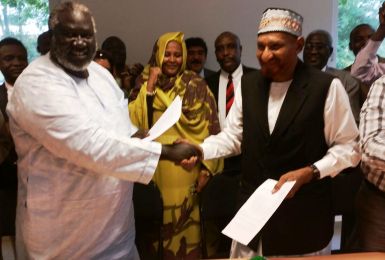Outcome of government sponsored dialogue encourages opposition to stick to its agenda: Mahdi
June 6, 2016 (KHARTOUM) – The chairman of the National Umma Party, al-Sadiq al-Mahdi, Monday said the outcome of the government sponsored National Dialogue Conference (NDC) has encouraged the opposition Sudan Call forces to stick to its demands for just peace and democratic reforms .

“Since several days I read the recommendations of the (NDC) six committees, and the recommendations of the social dialogue. And I was struck that these recommendations coincided with the desired (opposition) agenda in many (dispositions),” al-Mahdi said.
He further said that the Sudan Call forces will stick to its platform and work for a popular peaceful mobilization to achieve its legitimate demands or holding a national dialogue process leading towards the same goals.
Mahdi in his four-page statement enumerated several disposition included in the NDC recommendations such as the immediate cessation of hostilities and talks for a permanent ceasefire agreement, release of political detainees and prisoners, return of IDPs to their areas of origin after ensuring their security, release of public freedoms.
He stressed that other Sudanese forces are now advocating for similar or alike legitimate demands, which are now “achievable even outside the framework of the African Union sponsored dialogue process”.
The opposition leader last week met with the African Union High Level Implementation Panel (AUHIP) Thabo Mbeki and proposed him to meet the Sudanese Revolutionary Forces (SRF) again, pointing that the proposed Framework Agreement responds partially to the demand of the opposition groups for an equal dialogue.
The statement of the NUP leader also mentioned a memo labelled ”the National Initiative for Peace and Reform” handed over by 52 national figures to the Sudanese presidency calling on al-Bashir to establish a transitional government to address the national crises and make structural change in the system of governance.
In January 2014, Sudanese president Omer Hassan al-Bashir announced in a televised address to the nation a four-point plan for constitutional reforms “to stop the war and bring peace, political freedoms, fight against poverty and revitalise national identity”.
In October 2015, the national dialogue conference started amid calls to boycott it by the main opposition forces and armed groups in the country.
The National Dialogue Higher Committee said it would hold its next general assembly in October in order to adopt formally the recommendations
.
(ST)
